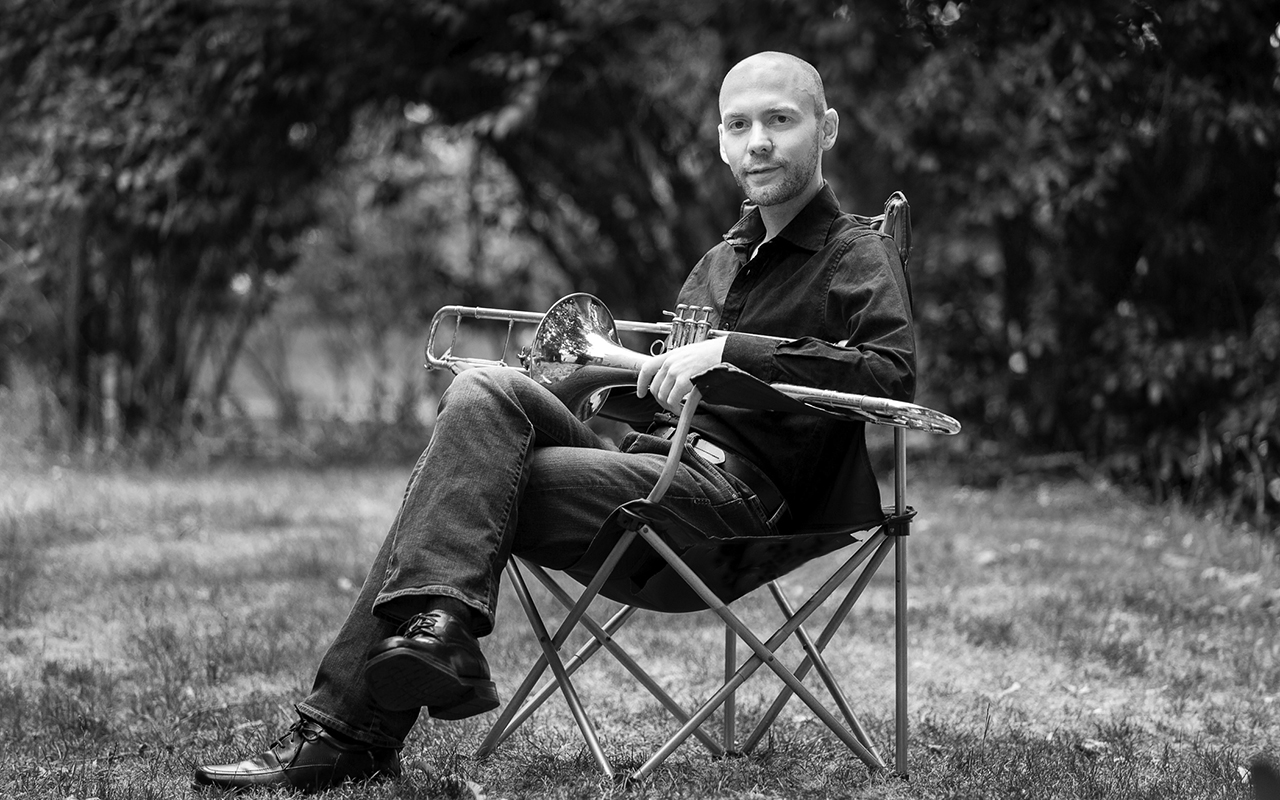
Christian Pincock photo by Daniel Sheehan
Chapel Performance Space
Thursday, August 1, 8pm
Christian Pincock is establishing himself in Seattle by breathing life into some tired mainstays of mainstream jazz. The musician, composer and arranger, who has been in town since January, came with a wealth of approaches, both large and small, both intuitive and shrewdly executed.
He will present his work on this release concert for Plentiful Excitement, a fine neo-mainstream disc. On the album, Pincock, a valve trombonist, performs with three colleagues from his three years in New Mexico, where he taught music and music-for-dance at the University of New Mexico. Robert Muller (piano), Mark Weaver (tuba) and Rick Compton (drums) all contribute impressively to Pincock’s pieces, which are assured, nuanced and plainly enchanting.
The album demonstrates the benefit of long gestation. Pincock developed the pieces over up to a decade, revising them and testing them with various band configurations to the point of impressively balanced, solid execution.
During his first six months in Seattle, Pincock has sought out local collaborators – those have included accomplished jazz-oriented musicians like pianist and vocalist Robin Holcomb, keyboardist Wayne Horvitz, trombonist David Marriott and French horn player Tom Varner. He has also hooked up with the fine collective of younger jazzers, Table & Chairs, for which he serves as a board member. And he has formed two quartets, one rock-oriented and electric, the other more mellow and jazzy.
For his CD release, he is calling on three of Seattle’s finest younger players: Aaron Otheim (piano), Jon Hansen (tuba) and Chris Icasiano (drums). The pianist and drummer are already mainstays of the younger Seattle jazz scene. Most fresh for audience members may be Pincock’s pairing with Jon Hansen; the combination of trombone and tuba underpins the Pincock sound. He came to include tuba in his pieces because he had trouble in Albuquerque finding a bass player who met his needs, but knew Weaver as a tuba ace. Now, in Seattle, he has in Jon Hansen a classically trained UW PhD, “with reading chops up the wazoo,” as Pincock puts it. Hansen also plays in two brass- and funk-oriented outfits, Fabulous Party Boys and Tubaluba Brass Band.
Whenever a jazz musician performs on the valve trombone, the question is posed: Why? Pincock first played slide trombone, but that changed during the early 2000s, at New England Conservatory of Music where he studied with the now-late Bob Brookmeyer, a valve trombonist. Pincock had, after all, never particularly liked the slide trombone; trumpet players had been his jazz inspirations.
From Boston, he went to the Manhattan School of Music for a master’s degree in jazz studies. New York provided many opportunities for bandstand and studio advanced education; he found those with Donny McCaslin, Darcy James Argue, Luis Bonilla, Ikue Mori and others.
Next, in New Mexico, he forged collaborations with the likes of Bobby Shew, Toshiko Akiyoshi, Lew Tabackin, Butch Miles, Matt Catingub and Alan Pasqua.
While in Albuquerque, he taught not only university jazz and music-for-dance courses, but also took a lead role in high-school and community programs. And, he hosted a weekly radio show called The House That Jazz Built on KUNM 89.9 FM Albuquerque/Santa Fe.
It was through that show that he got to know Seattleites Aaron Otheim, Chris Icasiano, and the rest of the Speak quartet, after he played their music on his radio show. He began to consider Seattle as his next port of call.
Pincock’s playing is unmistakably rooted in jazz tradition, but it benefits from his studies in many styles and techniques – from Baroque and European classical music; from the rhythmic structures of Latin and Hindustani music; from contemporary chamber music; and from the reaches of electronic music and free improvisation. He incorporates all those influences into a melodic playing and elaboration that rewards attentive listening. “I really want my influences to be organic,” he says. “And I don’t want the seams to show.”
Lately, for example, he has been considering what he can take away from Brazilian and Afro-Cuban clave music with its percussive rhythmic patterns: It is “music that has amazing swing, totally different from jazz, even though they call it swing, too,” he says. But, he says of his own music, “I don’t want it to sound like Afro-Cuban music.” Rather, he modifies clave patterns, interrupting or inverting them in ways that “go against the whole idea of clave.” And effectively so.
In essence, he says, it is the “gesture” of other musical forms that he is likely to incorporate into his compositions, which owe something to the Third Stream approaches of Jimmy Giuffre and others. So, for example, in his Afro-Cuban-influenced music, he bears in mind that “a phrase needs space and time to expand or breathe; then other elements may come in to take the momentum forward.
“Gesture and momentum, those are usually the tools I use.”
Admission is $5-$15, sliding scale. Copies of the CD Plentiful Excitement will be on sale at the concert, and then in CD format from www.CDbaby.com and www.ChristianPincock.net, and by digital download through iTunes, rhapsody.com and amazon.com.